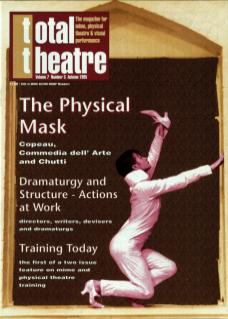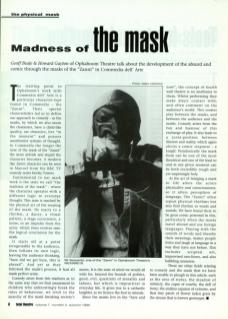The starting point to Ophaboom's work with Commedia dell' Arte is a particular character-type found in Commedia . the "Zanni". Their special characteristics led us to define our approach to comedy as the masks, by which we also mean the characters, have a child-like quality, are obsessive, live "in the moment and possess unorthodox systems of thought. In Commedia the longer the nose of the mask of the "Zanni" the more doltish and stupid the character becomes. A modern day Zanni character can be seen in Manuel from the BBC TV comedy series Fawlty Towers.
Fundamental to our mask work is the state we call "the madness of the mask" - where the character operates with a different logic to everyday thought. This state is reached by the physical act of the wearing of the mask. He reacts to a rhythm, a dance, a visual pattern, a stage occurrence, a noise, or an impulse from the actor, which then evolves into the logical conclusion for the mask.
It starts off at a point recognisable to the audience, then follows its own logic, leaving the audience thinking, "how did we get here, this is absurd". And yet as they followed the mask's process, it had all made perfect sense.
Comedy arises from this madness as, in the same way that we find amusement in children who unknowingly break the rules of behaviour, we revel in the anarchy of the mask breaking society's mores. It is the state of mind we would all wish for, beyond the bounds of politics, good, evil, questions of morality and taboos, but which is impractical in everyday life. It gives rise to a cathartic laughter, as we licence the fool to misrule.
Since the masks live in the "here and now", the concept of fourth wall theatre is an anathema to them. Whilst performing they make direct contact with, and often comment on the audience's world. This creates play between the masks, and between the audience and the masks. Comedy arises from the fun and humour of this exchange of play. It also leads to a juxta-position between illusion and reality, which again elicits a comic response - a laugh! Paradoxically the mask form can be one of the most theatrical and one of the least so and at any given moment can be both incredibly rough and yet surprisingly holy.
As the act of bringing a mask to life alters the actors physicality and consciousness, so it alters perception of language. The "Zanni" often repeat physical rhythms but also find rhythm in words and sounds. We have found there to be great comic potential in this, particularly when the masks travel abroad and use foreign languages. Playing with the sounds of words and thereby their meanings, makes people listen and laugh at language in a way they have not before. This includes scripted wit, improvised one-liners, and also babbling nonsense.
There are other fields relating to comedy and the mask that we have been unable to plough in this article, such as the area of status, the meadow of mimicry, the copse of cruelty, the dell of irony, the endless expanse of extreme, and that tiny patch of flower laden grass by the stream that is forever grotesque.

